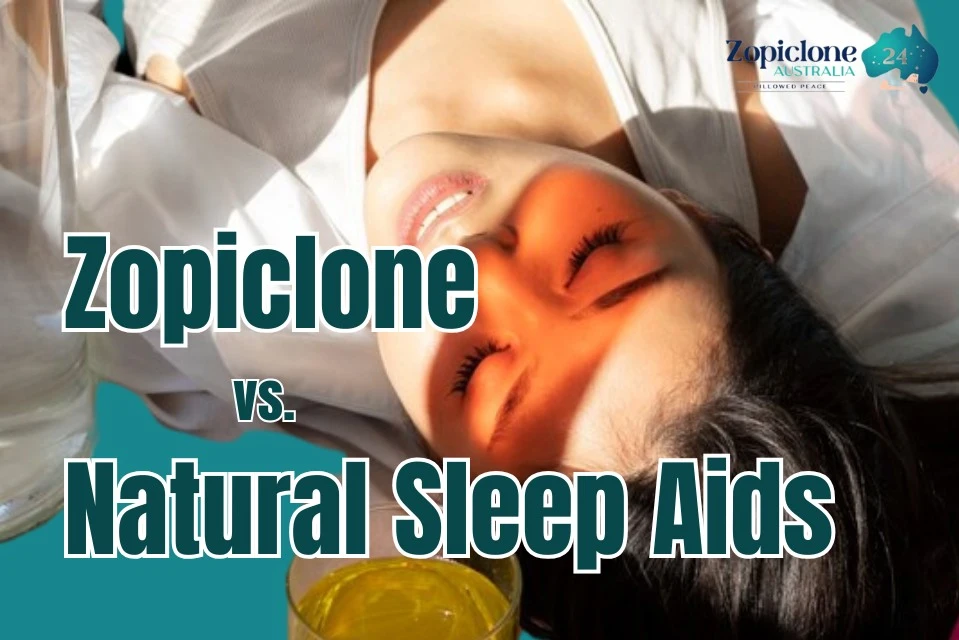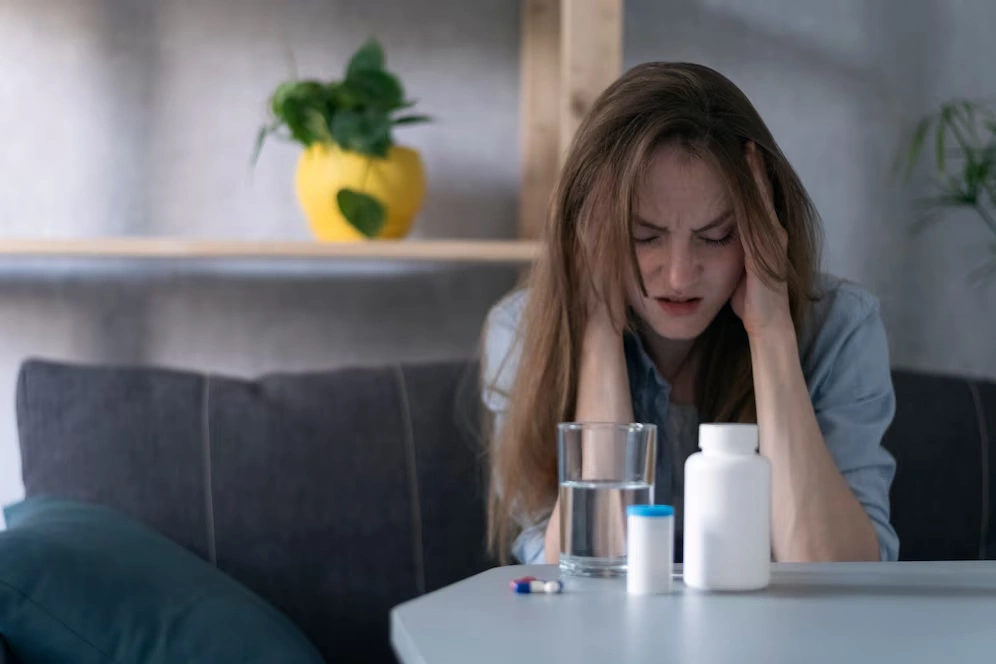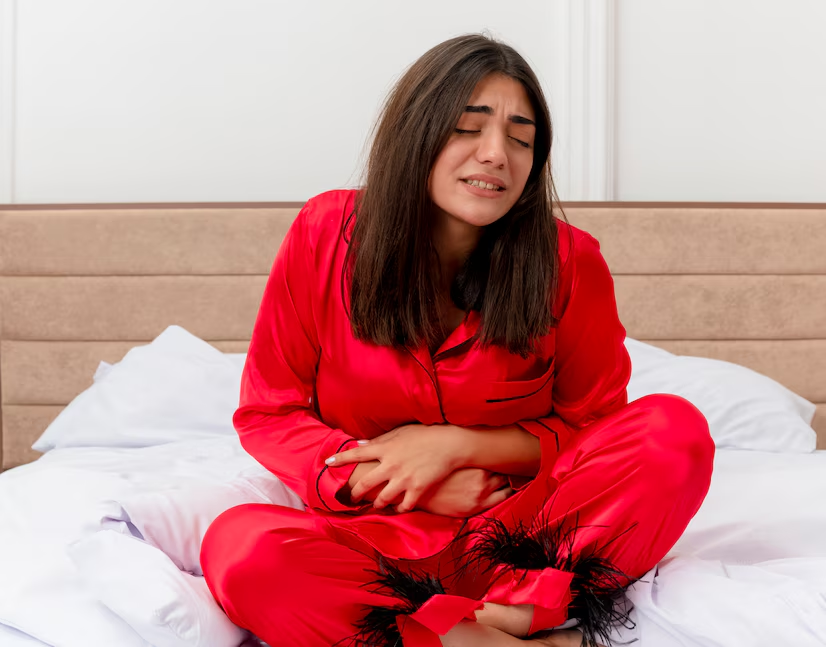Zopiclone vs. Natural Sleep Aids: Which Works Best for You?

Sleep is one of the most vital aspects of our health, yet millions of people worldwide struggle with it. Whether it’s due to stress, anxiety, lifestyle choices, or underlying medical conditions, getting a good night’s rest can often seem like an elusive goal. When traditional sleep patterns are disrupted, many people turn to sleep aids, but they often wonder: Should I use prescription medications like Zopiclone, or are natural sleep aids a better choice?
In this article, we will compare Zopiclone—a widely prescribed hypnotic medication—with various natural sleep aids. We’ll explore how they work, their benefits, side effects, and help you determine which might be the best option for improving your sleep.
What is Zopiclone?
Zopiclone is a medication commonly prescribed to treat short-term insomnia. It belongs to a class of drugs called non-benzodiazepine hypnotics, which are similar to benzodiazepines but generally considered less habit-forming. Zopiclone works by enhancing the activity of gamma-aminobutyric acid (GABA), a neurotransmitter that helps calm the brain and promote sleep. It is available under various brand names, such as Imovane, and typically prescribed for those struggling with sleep disturbances, either from acute causes (e.g., stress) or chronic insomnia.
How Does Zopiclone Work?
Zopiclone works by interacting with GABA receptors in the brain, which play a key role in reducing neural activity. By boosting GABA’s inhibitory effects, Zopiclone has a sedative effect on the brain, helping users to fall asleep more easily and stay asleep longer. It is fast-acting, usually taking effect within 30 minutes of ingestion, and works to induce a sense of calm, making it easier for individuals to drift off to sleep.
While Zopiclone is often effective for short-term use, it is not recommended for long-term insomnia treatment due to the risk of tolerance, dependence, and potential withdrawal symptoms.
The Pros and Cons of Zopiclone
Pros:
- Effective for insomnia: Zopiclone is fast-acting and effective in helping individuals fall asleep quickly and stay asleep through the night.
- Short-term use: When used for a short period (usually 2-4 weeks), Zopiclone can help individuals manage acute sleep problems without causing significant harm.
- Helps with both falling asleep and staying asleep: Unlike some other sleep aids, Zopiclone can be effective in treating both sleep onset and sleep maintenance insomnia.
Cons:
- Risk of dependence: Like all sedative medications, there is a risk of developing tolerance, meaning higher doses are required over time to achieve the same effect. This can lead to dependence and withdrawal symptoms when stopping the medication.
- Side effects: Common side effects include drowsiness, dizziness, dry mouth, and a metallic taste. Some users report feeling groggy or disoriented the next day.
- Short-term solution: Zopiclone is generally not recommended for long-term use due to the risk of dependence and potential withdrawal effects.
- Memory issues: Some individuals experience memory lapses or “amnesia” after taking Zopiclone, especially when it is taken at higher doses or in combination with alcohol or other sedatives.
Natural Sleep Aids: An Overview
While prescription medications like Zopiclone can be effective for treating sleep disorders, many people prefer natural sleep aids for their gentler, less risky approach. Natural sleep aids come in many forms, including herbal remedies, dietary supplements, and lifestyle changes. Some of the most popular natural sleep aids include:
- Melatonin
- Valerian Root
- Chamomile Tea
- Magnesium
- Lavender
- CBD (Cannabidiol)
Let’s take a closer look at how each of these natural options works and how effective they are for improving sleep.
Melatonin: The Sleep Hormone
The pineal gland in the brain naturally produces the hormone melatonin, which aids in controlling the sleep-wake cycle. The body receives a signal to go to sleep when melatonin levels rise in the evening. For those who have trouble falling asleep due to irregular sleep patterns, jet lag, or shift work, melatonin supplements can be a helpful solution.
How it works:
Melatonin supplements mimic the body’s natural production of the hormone, signaling the brain that it’s time to wind down. It’s most effective for people who have difficulty falling asleep, particularly those with disrupted circadian rhythms.
Pros:
- Widely available: Melatonin is readily available over the counter and is often considered a safe and natural sleep aid.
- Minimal side effects: Melatonin generally has few side effects when taken in the appropriate doses, though some individuals may experience mild headaches or dizziness.
- Helps with jet lag and shift work: It’s particularly useful for individuals who have trouble adjusting to new time zones or irregular work hours.
Cons:
- Limited effectiveness for deep sleep: While melatonin can help you fall asleep, it may not improve the quality of your sleep. It may not be helpful for those who struggle with staying asleep or achieving deep, restorative sleep.
- Not suitable for everyone: Some individuals may experience side effects, such as vivid dreams or next-day grogginess, especially at higher doses.
Valerian Root: The Herbal Sedative
Valerian root has been used for centuries as a natural remedy for insomnia and anxiety. It is an herb that is believed to have mild sedative effects on the nervous system, promoting relaxation and improving sleep quality.
How it works:
Valerian root contains compounds that are thought to increase GABA levels in the brain, similar to the way Zopiclone works. It also appears to enhance the activity of other neurotransmitters involved in relaxation, like serotonin and dopamine.
Pros:
- Natural sedative: Valerian root is known for its ability to promote relaxation and improve sleep onset.
- Fewer side effects: Compared to prescription sleep medications, valerian root is generally well-tolerated, with fewer reports of serious side effects.
- Non-habit-forming: Valerian root is considered non-habit-forming, making it a safer long-term option than many pharmaceutical sleep aids.
Cons:
- Takes time to work: Unlike Zopiclone, valerian root may take a few days or even weeks to have a noticeable effect on sleep quality.
- Possible side effects: While rare, some users may experience headaches, dizziness, or digestive upset.
Chamomile Tea: A Gentle Sleep Aid
Chamomile is a well-known herb with mild sedative properties. It is often consumed in the form of tea, making it an easy and comforting way to wind down before bed.
How it works:
Apigenin, an antioxidant found in chamomile, attaches to the brain’s GABA receptors to aid in relaxation. It is often used to alleviate mild insomnia and anxiety.
Pros:
- Gentle and relaxing: Chamomile tea is soothing and can help prepare the body and mind for sleep without causing grogginess.
- Safe for long-term use: Chamomile is gentle and safe for most people, making it suitable for long-term use without the risk of dependence.
- Easy to incorporate into bedtime routine: Drinking a warm cup of chamomile tea before bed can become a relaxing ritual that signals to your body that it’s time to sleep.
Cons:
- Mild effect: Chamomile is not as potent as other sleep aids, so it may not be effective for individuals with more severe insomnia.
- Possible allergic reactions: People who are allergic to ragweed or related plants may experience allergic reactions to chamomile.
Magnesium: The Relaxation Mineral
Magnesium is an essential mineral that plays a role in over 300 enzymatic processes in the body, including the regulation of neurotransmitters that are involved in sleep. Magnesium deficiency has been linked to poor sleep, so supplementation may help improve sleep quality.
How it works:
Magnesium promotes relaxation by regulating neurotransmitters like GABA and reducing cortisol, the body’s stress hormone. It also helps to relax muscles, which can further enhance sleep quality.
Pros:
- Improves sleep quality: Magnesium is known to improve both sleep onset and sleep quality, making it effective for those who struggle to stay asleep.
- Multiple health benefits: In addition to promoting better sleep, magnesium supports heart health, muscle function, and bone health.
Cons:
- Potential digestive upset: Taking high doses of magnesium can cause gastrointestinal discomfort, such as diarrhea.
- Not a quick fix: Magnesium may take some time to show noticeable effects, so it may not provide immediate relief for acute insomnia.
A well-liked essential oil for its calming and relaxing qualities is lavender. It is often used in aromatherapy to reduce anxiety and promote restful sleep.
Lavender: The Aromatherapy Solution
How it works:
Lavender is believed to have mild sedative effects, which can help reduce anxiety and create a more restful environment for sleep. It can be used in a diffuser, applied topically (diluted in a carrier oil), or added to a bath before bed.
Pros:
- Gentle and non-invasive: Lavender is a safe, non-invasive sleep aid that can be used as part of a relaxing bedtime routine.
- Aromatherapy benefits: In addition to promoting sleep, lavender essential oil has mood-boosting and stress-relieving effects.
Cons:
- Mild effect: Like chamomile, lavender may not be strong enough for those with chronic or severe insomnia.
- Allergic reactions: Some individuals may have allergic reactions to lavender or experience skin irritation if applied directly.
Which Sleep Aid is Right for You?
Choosing the right sleep aid depends on a variety of factors, including the severity of your insomnia, your preferences regarding natural versus pharmaceutical options, and your tolerance to potential side effects. Below, we break down some scenarios in which different sleep aids might be best suited to help you achieve a better night’s rest.
1. For Short-Term Use and Immediate Relief: Zopiclone
If you’re facing short-term sleep problems, such as those caused by stress, anxiety, or an acute disruption to your sleep schedule (e.g., jet lag or shift work), Zopiclone can provide fast and effective relief. Zopiclone works quickly to help you fall asleep and stay asleep, often within 30 minutes. It can be a lifesaver for someone who needs to get a good night’s sleep in a short time frame.
However, it is important to keep in mind that Zopiclone is not a long-term solution. The risk of tolerance and dependence, especially with extended use, means that it is best reserved for occasional or short-term use only. If you have chronic sleep problems, it’s crucial to address the root cause of your insomnia, whether through therapy, lifestyle changes, or alternative natural remedies.
2. For Chronic Insomnia or Those Seeking a Natural Approach: Melatonin or Valerian Root
For individuals with chronic sleep disturbances or those who prefer natural remedies, melatonin or valerian root could be great options to consider.
- Melatonin is especially useful for those with disrupted circadian rhythms, such as shift workers, travelers experiencing jet lag, or individuals whose sleep problems are caused by inconsistent sleep-wake cycles. It is widely available, affordable, and generally well-tolerated. If you’re struggling with falling asleep at a specific time (rather than staying asleep), melatonin may be the most effective natural option.
- Valerian Root is a great choice for people seeking a natural remedy to promote relaxation and improve sleep quality. While it may take a few days or weeks to notice the full benefits, valerian root has a calming effect on the nervous system and may help with both falling asleep and staying asleep. If you’re looking for something that promotes longer-term sleep improvements, valerian root is a gentle, non-habit-forming option.
3. For Mild Sleep Problems or Relaxation: Chamomile Tea or Lavender
If your sleep issues are mild and you’re looking for a gentler, relaxing sleep aid, chamomile tea or lavender may be the perfect option. Chamomile tea is a soothing, low-risk choice that you can easily incorporate into your bedtime routine. Drinking a warm cup of chamomile tea before bed can not only help you unwind but also create a calming ritual to signal to your body that it’s time to rest.
Lavender is another effective, non-invasive solution. The calming effects of lavender essential oil can help you relax and create an optimal sleep environment. Using a diffuser with a few drops of lavender oil or adding it to a warm bath before bed may improve your sleep quality without the need for oral supplements.
These natural remedies are best suited for those who experience difficulty falling asleep due to stress or anxiety but don’t have a serious, chronic insomnia condition. They are gentle and promote relaxation, making them ideal for those who prefer to avoid medications altogether.
4. For Sleep Quality and Muscle Relaxation: Magnesium
If you’re looking to enhance the quality of your sleep and experience deeper, more restorative rest, magnesium could be a great option. Magnesium helps regulate neurotransmitters like GABA and supports muscle relaxation, both of which can improve sleep quality. It’s particularly beneficial for individuals who have trouble staying asleep or experience muscle tension that disrupts their rest.
Magnesium can be taken in supplement form, or you can opt for topical magnesium oils or lotions that you rub onto your skin. It’s an excellent long-term solution for those looking to improve overall sleep quality without the risk of dependence.
5. For General Anxiety or Stress-Related Sleep Issues: CBD (Cannabidiol)
CBD has gained significant attention in recent years for its potential therapeutic benefits, including its ability to promote relaxation and help with sleep. While the research is still ongoing, many people report feeling calmer and more relaxed after taking CBD, which can indirectly improve sleep quality.
In order to assist control mood, anxiety, and stress, CBD interacts with the body’s endocannabinoid system. Unlike THC (the psychoactive compound in cannabis), CBD does not produce a “high” and is generally well-tolerated with minimal side effects. It can help reduce anxiety levels, which is often the underlying cause of sleep disturbances for many people.
If stress or anxiety is contributing to your sleep problems, CBD might offer a more natural way to manage those issues and improve your sleep. However, like all supplements, it’s essential to consult with a healthcare professional to determine the right dosage and avoid potential interactions with other medications you may be taking.
Potential Risks and Side Effects of Sleep Aids
While natural sleep aids tend to be safer and come with fewer side effects compared to prescription medications, it’s still important to understand the potential risks, particularly when used in conjunction with other treatments or medications. Below are some common side effects associated with both Zopiclone and natural sleep aids:
- Zopiclone: Common side effects of Zopiclone include daytime drowsiness, dizziness, memory issues, and a metallic taste in the mouth. There is also a risk of dependence with prolonged use, so it’s essential to use Zopiclone only as directed by a healthcare provider and avoid long-term use without proper guidance. Combining Zopiclone with alcohol or other sedatives can increase the risk of dangerous side effects, such as respiratory depression and excessive sedation.
- Melatonin: Although melatonin is generally considered safe for short-term use, it can cause mild side effects, such as dizziness, headaches, or next-day grogginess. It may also interact with certain medications, such as blood thinners or immunosuppressants. It’s best to start with a low dose and consult a doctor if you’re pregnant, breastfeeding, or have any underlying health conditions.
- Valerian Root: Valerian is generally safe for short-term use, but it may cause dizziness, headaches, or digestive issues in some individuals. It may also interact with medications that affect the central nervous system, so it’s important to consult a healthcare provider before using valerian, especially if you are taking other sedatives or antidepressants.
- Chamomile Tea: Chamomile is generally considered safe for most people, but those who are allergic to ragweed, daisies, or other members of the Asteraceae family may have an allergic reaction. Pregnant or breastfeeding women should also consult with a healthcare provider before using chamomile.
- Magnesium: Magnesium is well-tolerated for most people, but in high doses, it can cause gastrointestinal issues, such as diarrhea or cramping. It’s important to use the correct dosage and choose a form of magnesium that’s easily absorbed, such as magnesium citrate or magnesium glycinate.
- Lavender: Lavender is generally safe and well-tolerated, but in rare cases, it may cause allergic reactions or skin irritation. If you’re using lavender essential oil topically, it’s important to dilute it with a carrier oil to avoid skin sensitivity.
- CBD: While CBD is well-tolerated by most people, it can cause mild side effects such as dry mouth, dizziness, and changes in appetite. Additionally, it might interfere with several drugs, especially those that the liver metabolizes. As with any supplement, it’s important to start with a low dose and consult with a healthcare provider, especially if you are taking other medications.
Conclusion: Zopiclone vs. Natural Sleep Aids
When it comes to improving sleep, both Zopiclone and natural sleep aids can be effective, but each comes with its own set of benefits and potential drawbacks. Zopiclone is a fast-acting solution for short-term insomnia, particularly for those who need immediate relief. However, due to its risk of dependence and side effects, it’s best suited for occasional use and should not be relied on for long-term sleep management.





